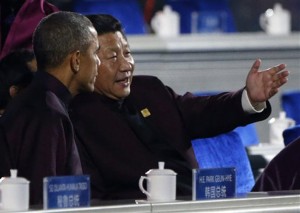
Associated Press
By Joe McDonald
Associated Press
HUAIROU, China — China is trying to boost its status as a regional power during a summit of world leaders by launching a rapid-fire series of trade and finance pacts that might dilute U.S. influence.
Opening Tuesday’s Asia-Pacific Economic Cooperation summit, Chinese President Xi Jinping urged the 21 economies present to push ahead with regional economic integration and other efforts to promote business ties.
“Clarify the goal, the direction, the road map,” Xi told the other leaders including President Barack Obama and Russia’s Vladimir Putin. “At an early date, let prospects become reality and make the two sides of the Pacific highly open and integrated.”
On the eve of the gathering, Beijing announced a free-trade agreement Monday with South Korea. Also Monday, regulators approved a plan to open Chinese stock markets wider to foreign investors by linking exchanges in Hong Kong and Shanghai. That followed the weekend announcement of a $40 billion Chinese-financed fund to improve trade links between Asian economies.
At the summit, China is promoting its own regional free-trade pact, despite U.S. pressure to make progress on other initiatives. It is the first time Beijing has taken the lead in promoting a multinational trade agreement.
The moves reflect Beijing’s insistence on having a bigger role in what it sees as U.S.-dominated economic and security structures to reflect China’s status as the world’s second-biggest economy.
China says its motives are benign. But its growing economic weight as the top trading partner for most of its neighbors from South Korea to Australia could erode U.S. influence.
“We are duty-bound to create and fulfill an Asia-Pacific dream for our people,” Xi said Sunday in a speech at a business conference ahead of APEC.
APEC is the first major international gathering in China since Xi took power, and the presence of world leaders gives Beijing a platform to lobby for a bigger leadership role.
On Monday, Xi met Japanese Prime Minister Shinzo Abe and shared an awkward handshake seen as a gesture toward easing two years of tensions between Asia’s biggest economies.
A spat between China and Japan over islands in the East China Sea and other issues has raised fears of a military confrontation, which could draw in the United States, Japan’s ally. On Friday, the two sides issued a joint statement agreeing to gradually resume political, diplomatic and security dialogues.
Also this year, Beijing joined 20 other Asian countries in launching a regional development bank, despite U.S. objections that it needlessly duplicated the World Bank’s work. In May, Xi called for creation of a new Asian structure for security cooperation based on a group that excludes Washington.
American officials chafe at Beijing’s insistence on promoting its proposed trade pact, the Free Trade Area of the Asia Pacific.
It comes at a time when progress on a U.S.-led initiative, the Trans-Pacific Partnership, has stalled. The chief U.S. trade envoy, Michael Froman, said Saturday the two pacts are “not in competition,” but he said Beijing should focus on wrapping up a U.S.-Chinese investment treaty and a separate agreement to lower barriers to trade in information technology.
The TPP includes the United States, Japan and 10 other countries, but excludes China.





